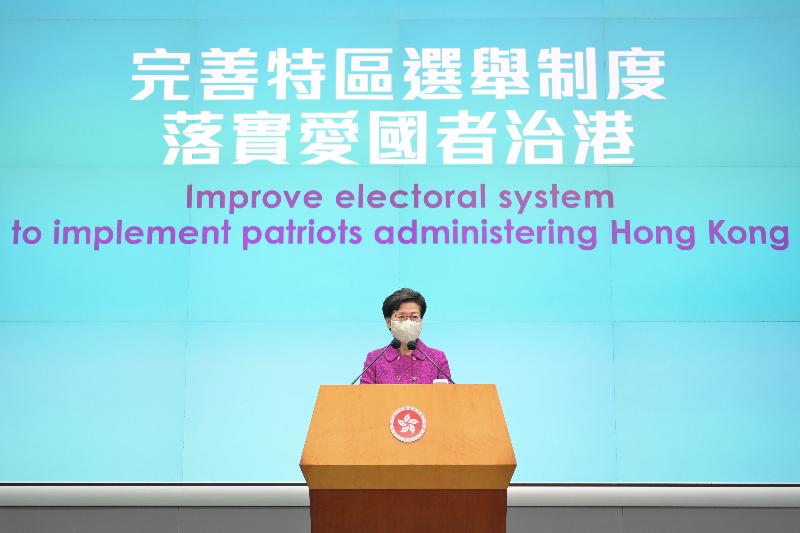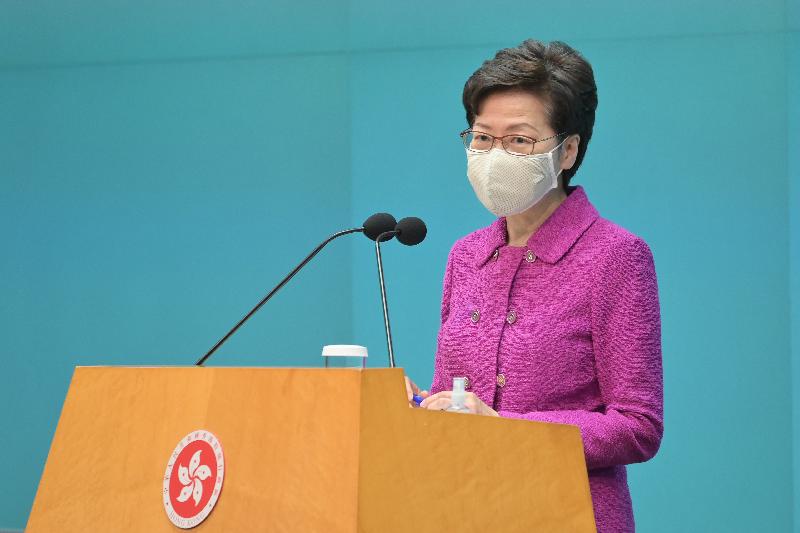Following is the transcript of remarks by the Chief Executive, Mrs Carrie Lam at a media session today (March 8):
Reporter: The first one, with all the drastic changes along with the vetting mechanism, how can you justify that Hong Kong's electoral system will still meet the international standard of democratic elections? You just now said that you will listen to the people's view. Could you clarify, will the Government launch a public consultation exercise on that? The second question, some critics and scholars say that decades of efforts to improve the democracy in Hong Kong now have come to nothing with Beijing's proposed changes. Will you take the responsibility for the retrogression, given that the months of unrest in 2019 happened during your term of office? The third question, it's about yourself, will you run for the CE election next year and are you confident that you will still enter the race with the tightened threshold for running the CE election? Thank you.
Chief Executive: Let me give a very succinct and clear answer to the last question first. What I am doing is not about my personal preference or inclination. I'm doing this to improve the electoral system in Hong Kong. I'm not going to give you any reply on that particular question, and I hope society will move away from looking at individuals but look at the electoral system that we need to improve.
Let me address seriously the other questions. There is no so-called international standard of democracy. Every democracy has to look into the proper context of that particular country, or that particular place. One will also have to look into the evolution of the system over a very long period of time. The most relevant context to look at Hong Kong's electoral system and political development is "One Country, Two Systems". If "One Country, Two Systems" could not be safeguarded, there is no point in talking about any other things because Hong Kong's prosperity and stability will not be assured. I hope that Hong Kong people will realise that what we are now facing is the risks that are being brought by the deficiencies in the electoral system that may even undermine this very important and fundamental principle of "One Country, Two Systems". And more so, it may even undermine the fundamental principle of safeguarding national sovereignty, security and development interests of the country.
Since the reunification in 1997, because I was personally involved in part of that exercise, the Central Authorities had been very sincere and very committed in trying to move towards the objective of universal suffrage in the selection of the Chief Executive. Three rounds of electoral changes have taken place, but only one was so-called "successful". When one looked back now, perhaps that has created some of the problems that we are now facing. It would be very wrong to perceive what the Central Authorities are now doing as a retrogression. It is trying to remedy the deficiencies in the electoral system and put it back into its proper context of "One Country, Two Systems", ensuring that we are able to safeguard national security, development interests and long-term stability and prosperity in Hong Kong so that it could then move forward. If it is outside those fundamental principles we will not be making any progress whatsoever, and we may even be facing a lot of risk down the road as we have seen since the latter part of 2019.
The third point about public consultation, as I have said at the very outset and I want to repeat it again, this time round, the improvement to the electoral system in the Hong Kong SAR in order to implement patriots administering Hong Kong is directed and steered by the Central Authorities in exercise of its jurisdiction and constitutional power. Because of the urgency of completing the whole exercise which involves local legislation, we will not be able to do the so-called "extensive public consultations". But we have been listening to the people about their concerns of the electoral system, about the malfunctioning of the Legislative Council in the past. I am sure when we present the bill to the Legislative Council for scrutiny, members of the Legislative Council will continue to listen to the views from the public. That is how we are going to take forward this very important, complicated and urgent exercise.
About your comment of democracy, which I have also already responded to, Article 45 and Article 68 of the Basic Law have not been changed, so taking into account Hong Kong’s actual situation, in a gradual and orderly manner, we could still move forward and achieve that ultimate objective in giving people "one person, one vote" in the selection of the Chief Executive and in forming the Legislative Council in future.
I am actually quite gratified that as the Chief Executive of the Hong Kong SAR, I’m now doing a couple of very important improvements that will ensure the long-term prosperity and stability of Hong Kong that will safeguard the implementation of "One Country, Two Systems". The first one is the enactment and the implementation of the National Security Law, which had been outstanding. For the last 23 years, Hong Kong is perhaps the only place in the world that has no legislation to safeguard national security. The second thing is now we are improving the electoral system by making sure that whoever is governing and administering Hong Kong in future is somebody who loves the country, who loves Hong Kong. When I said that somebody it's not just the Chief Executive because if you look at Chapter 4 in the Basic Law, Hong Kong's political structure comprises the Chief Executive, the Executive, the Legislature, the Judiciary, the district organisations and the whole civil service. That's my response to your final point about my own perception of the important assignments that have happened during my tenure. Thank you.
Reporter: Why should Hong Kong people take these elections, these coming elections, seriously if they think that it's designed to favour certain candidates from pro-establishment parties and there'll be so much vetting and screening involved? Secondly, you mentioned that this time around the CPG would be steering the consultations. Does this mean that elections and reforms are no longer an issue for Hong Kong people in the future? And finally, just on the LegCo election which last year was cancelled, you seemed uncertain about whether it would be able to take effect this year. Are you hopeful that it will be able to take effect this year?
Chief Executive: Thank you for the three questions. The improvements to the electoral system in the Hong Kong SAR are not designed to favour someone. It is designed to ensure that whoever is administering Hong Kong is patriotic, and this is only right in terms of political ethics. How could one who is governing a place not patriotic to that country? It is inconceivable. This is the objective of this exercise, and I have to make it very clear that the improvements only seek to ensure that it is patriots administering Hong Kong. And it is only when that is assured then we could ensure the stability and prosperity of Hong Kong, we could effectively safeguard Hong Kong SAR's constitutional order under the Basic Law and we could also effectively resolve those deep-seated problems in Hong Kong and achieve Hong Kong's prosperity and stability. Once Hong Kong people realise all these justifications, I'm sure that they would take these elections very seriously, because by returning people who are patriotic, who are going to follow the "One Country, Two Systems", then Hong Kong will have a much brighter future in terms of economic development and prosperity.
Whether Hong Kong people will continue to have a role in the future development of Hong Kong's political structure, the answer has to be yes. But it has to take place within the proper constitutional framework, and that is "One Country, Two Systems". What we are now seeing is deficiencies in the electoral system, which could be exploited by people, including some external forces, and hence return politicians who may take advantage of their position to undermine governance or even to undermine national security and development interests of the country. When everything is now being restored to its proper constitutional order, since Basic Law Article 45 and Basic Law Article 68 are being maintained and retained, then the chance will come, the time will come, for Hong Kong's political system to continue to move forward in a gradual, orderly manner with a view to achieving that ultimate objective of universal suffrage in the selection of the Chief Executive.
The third question is about the timing of the next general election of the Legislative Council. Last July, because of the very serious COVID-19 pandemic situation, I had no choice but to invoke the emergency legislation to postpone – we have not cancelled – to postpone the election by one year to September 5 this year. I could not tell you categorically – I will tell you at some point, but at the moment I am not yet in a position to tell you whether we could adhere to September 5, 2021 as the date for the general election of the Legislative Council, because there are still several steps to be completed before a LegCo election could take place under the set of improved electoral arrangements that the National People's Congress is going to make a decision on later this week, and then the National People's Congress Standing Committee is going to amend Annex I and Annex II of the Basic Law accordingly. But as our work rolls forward, I will use the first opportunity to tell you when a LegCo election will take place. Thank you.
(Please also refer to the Chinese portion of the transcript.)
Follow this news feed: East Asia







